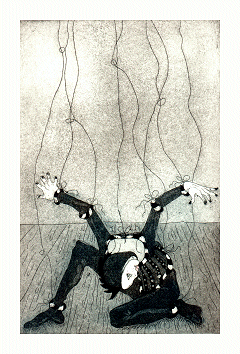Question: Can you guess where I’m writing this?
Answer: As I write, I’m sitting in the driver’s side of my car, parked in an illegal spot in an industrial park.
The very sensation that I might get my ass towed is actually what makes me so productive. At any moment, a police officer might tap on my window. Better yet, an angry pin-striped executive might come out and give me a few choice words. God, sitting in someone else’s parking space makes me feel so alive: watchful, wary, adrenelated.
I’m an usual writer for one big reason: I write like a bird. I swoop down, roost—maybe even nest—and then I flutter off. I only write in a spot if I’m feeling the vibes.
Before this blissful moment today, I spent a month writing at my friends’ house. I showed up, hung out. I decided then and there that I would sprawl out on their couch for a while. I laid out my flashcards on the Persian carpet and took over the guest bedroom. Two weeks into this, I suddenly realized that this was exactly how my hosts got their most recent cat, an abandoned stray with piercing blue eyes. It had done the same thing. That cat did not like me. It could see a fellow traveler—a rival, a nemesis and a double. It’s blue eyes flashed like Northern Lights and it always managed to sit on my flashcards.
I’d been writing at home for a while, spending most of the time on the purple couch in the living room. That was nice. But then my wife went away on a trip and the house felt lonely and empty. As you know, I am writing about an alcoholic and, in all that emptiness, I began to feel the urge to drink. So, I drank and drank and drank. And then there was nothing in the house but empty bottles. That’s when I decided that I should find a new place to write.
Of course, I have an office. It’s a special, separate office…and I even pay for it. But it feels somehow un-right. It’s cold. I thought it would feel good but it doesn’t. When I do work in it, I often perch on the other side of the desk where the visitor sits. That temporariness is what makes the writing process move. Offices, because they are made for the purpose, just feel like mousetraps.
In Iowa, where I taught Creative writing, I had two offices both of which did not get much use—one provided by the college and one at home. The official office was in an older Victorian building that used to be the women’s dorms. It was picturesque and roomy and quaint. I was on the fourth floor—the attic–with sloped ceilings and very civilized parlor furniture. I hated it. It reminded me that writing was actually a job that I was paid for; somehow, this managed to suck every ounce of pleasure away from the experience.
I also had a home office. I filled it with heavy wooden Craftsman furniture and decided that it would be a man’s lair: so messy that nobody would dare enter it. At the time, I had just seen the movie Beautiful Mind about a schizophrenic math professor—John Nash–who eventually wins the Nobel Prize. This heavily influenced my décor. Remember the crazy room in which he works out all sorts of connections with a collage-work of newspaper clippings and yarn? That was the reference point in my head when I started to “decorate.” It did become a good replica of that room. And I did succeed in making it into a place that nobody would intrude into…including me.




































